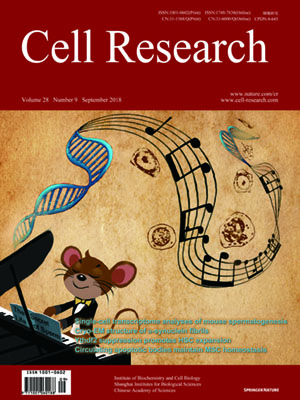
Volume 28, No 9, Sep 2018
ISSN: 1001-0602
EISSN: 1748-7838 2018
impact factor 17.848*
(Clarivate Analytics, 2019)
Volume 28 Issue 9, September 2018: 934-951
ORIGINAL ARTICLES
Imbalance of the reciprocally inhibitory loop between the ubiquitin-specific protease USP43 and EGFR/PI3K/AKT drives breast carcinogenesis
Lin He 1, Xinhua Liu 1,2,3, Jianguo Yang 1, Wanjin Li 1, Shumeng Liu 2, Xujun Liu 1, Ziran Yang 1, Jie Ren 1, Yue Wang 2, Lin Shan 2,
Chengjian Guan 4, Fei Pei 5, Liandi Lei 6, Yu Zhang 1, Xia Yi 1, Xiaohan Yang 1, Jing Liang 1, Rong Liu 4, Luyang Sun 1 and Yongfeng Shang 1,2,3
1Key Laboratory of Carcinogenesis and Translational Research (Ministry of Education), Department of Biochemistry and Molecular Biology, School of Basic Medical Sciences,Peking University Health Science Center, Beijing 100191, China; 2Department of Biochemistry and Molecular Biology, School of Basic Medical Sciences, Capital Medical University,Beijing 100069, China; 3Department of Biochemistry and Molecular Biology, School of Basic Medical Sciences, Tianjin Medical University, Tianjin 300070, China; 4Department of
Hepatobiliary and Pancreatic Surgical Oncology, Chinese People’s Liberation Army General Hospital, Beijing 100853, China; 5Department of Pathology, School of Basic Medical Sciences, Peking University Health Science Center, Beijing 100191, China and 6Laboratory of Molecular Imaging, Peking University Health Science Center, Beijing 100191, China
Correspondence: Correspondence: Luyang Sun (luyang_sun@hsc.pku.edu.cn) or Yongfeng Shang (yshang@hsc.pku.edu.cn)
Hyperactivation of EGFR/PI3K/AKT is a prominent feature of various human cancers. Thus, understanding how this molecular cascade is balanced is of great importance. We report here that the ubiquitin-specific protease USP43 is physically associated with the chromatin remodeling NuRD complex and catalyzes H2BK120 deubiquitination. Functionally this coordinates the NuRD complex to repress a cohort of genes, including EGFR, which are critically involved in cell proliferation and carcinogenesis. We show that USP43 strongly suppresses the growth and metastasis of breast cancer in vivo. Interestingly, USP43 also exists in the cytoplasm, where it is phosphorylated by AKT, enabling its binding to the 14-3-3β/ε heterodimer and sequestration in the cytoplasm. Significantly, hyperactivation of EGFR/PI3K/AKT in breast cancer is associated with the cytoplasmic retention of USP43 and thus, the inhibition of its transcriptional regulatory function. Moreover, cancer-associated mutations of USP43 affect its subcellular localization and/or epigenetic regulatory functions. Nuclear USP43 is significantly reduced in breast carcinomas and is associated with EGFR accumulation and AKT hyperactivation. A low level of nuclear USP43 correlates with higher histologic grades and poor prognosis. Our study identifies USP43 to be an H2BK120 deubiquitinase and a potential tumor suppressor and reveals a reciprocally inhibitory loop between USP43 and EGFR/PI3K/AKT, whose imbalance drives breast carcinogenesis.
https://doi.org/10.1038/s41422-018-0079-6
FULL TEXT | PDF
Browse 1090


